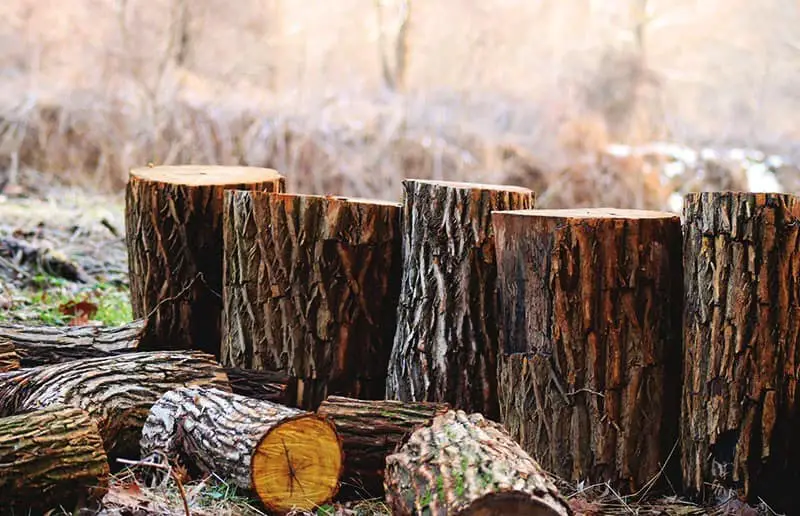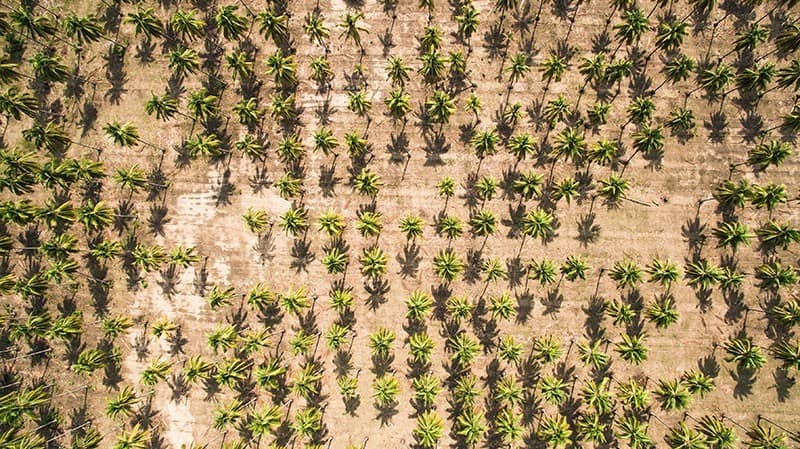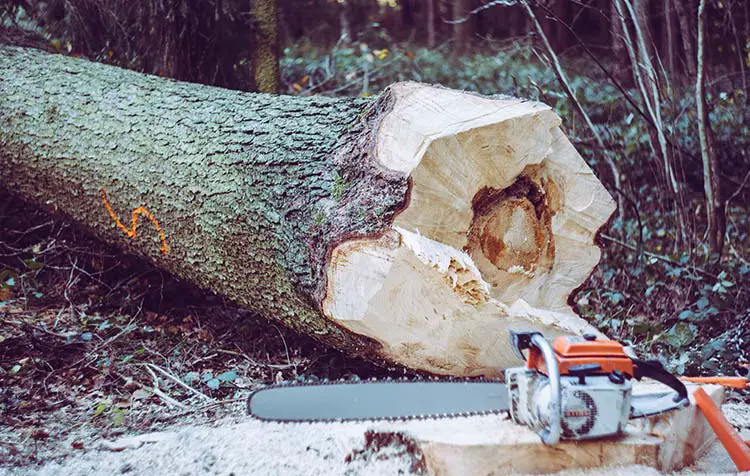The deforestation of our planet's forests has become one of the most biggest environmental problems of our time developed. Trees play a crucial role for life on earth. For example, they regulate the water balance of the soil, store the CO2 and are the basis of life for the majority of all animal and plant species on our planet. Nevertheless, between 1990 and 2015 alone, we destroyed an area of forest worldwide that is 58 times the size of Switzerland.₁ We must now learn to treat wood as a resource with respect and care.
In this article, therefore, I would like to paint you a detailed picture of the deforestation of our forests and give you everything you need to know about the causes, consequences and, above all, solutions in the fight against this environmental problem.
Here is another short Table of contents about the article:
Deforestation Facts, Figures & Statistics

In order to be able to take a closer look at the reasons and consequences and to be able to work out sensible solutions, it is basically worth taking a look at the statistics. Therefore, in this paragraph I would like to give you a short overview of the most important facts and figures about deforestation in Germany, Europe and the world, as well as some general statistics about the forests on our planet.
General statistics on the forest
The following statistics₂ are taken from the WWF's annual forest report:
- There are 11.1 million hectares of forest₃ in Germany.
- There are about 4 billion hectares of forest₄ worldwide.
- Forests are home to 80 percent of land-dwelling species.₅
- Tropical rainforests are home to 50 percent of all animal and plant species.₆
- Forests store half of terrestrially sequestered carbon.₇
Especially with the last-mentioned facts it is not surprising that the global deforestation has far-reaching consequences for animals, plants and also us humans.
Statistics on deforestation in Germany
It is also worth taking a look at the stock and deforestation of German forests. In the following you will find some crucial statistics of the tree population and deforestation in Germany:
- The timber stock in Germany increased by 7% between 2008 and 2018.₈
- According to the 2012 Federal Forest Inventory, Germany had a timber loss of 1,091 million m3 to be recorded.₉
- The survey also confirms at the same time an increase of 1.252 million m3 of the wood supply in Germany.₁₀
The timber stock in Germany is basically on an upward trend. Less wood has been used than has grown back.
Facts & figures on global deforestation
Unfortunately, forests are under greater threat worldwide than here in Germany. Ultimately, this poses a threat to all living creatures on this planet. In the following I would like to show you some important statistics:
- Between 1990 and 2015, 239 million hectares of the world's natural forests were destroyed.₁₁
- At 29.4 million hectares, an area of forest the size of Great Britain and Ireland was deforested worldwide in 2017 alone.₁₂
- At 15.8 million hectares, the tropical rainforest was affected by deforestation, according to Global Forest Watch (GFW).₁₃
- Brazil (4.52 million hectares), the Democratic Republic of Congo (1.47 million hectares) and Indonesia (1.3 million hectares) alone destroyed 7.29 million hectares of rainforest in 2017.₁₄
- According to GFW, the expansion of agriculture (including for palm oil, soy) and timber and pulp plantations are responsible for 80 percent of the forest loss.₁₅
- The destruction of forests and their soils contribute 15% to man-made greenhouse gases.₁₆
Global deforestation is advancing in leaps and bounds, and it is more than time to do something about it. In order to be able to work out sensible solutions, I would therefore like to talk about the causes of deforestation in the next paragraph.
Reasons for deforestation

Forests don't just disappear. Global deforestation has complex, but nevertheless clear causes. In the following, I would like to first list them and then explain them to you in more detail.
- Creation of areas for agriculture & cattle pastures
- New place as a usable area for plantations
- Extraction of mineral resources from the forest soils
- Construction projects for large dams
- Production of consumer goods
These are the main causes of deforestation. Of course, global forest loss is also linked to forest fires, which also occurred more frequently in Germany in 2018 due to increased periods of drought.₁₇
Before I move on to the consequences of deforestation, I would like to briefly explain the above causes for you.
Arable land for agriculture & cattle pastures
Forests must give way to make room for arable land for the cultivation of Sugar cane, bananas, coffee, oil palms and especially soybeans to make. Not because we humans consume so much soy - much of the soy meal is used to make animal feed to fatten cattle as well as chickens and pigs. Small farmers and indigenous people have been displaced by large industries and the global soy trade has increased from 80 million tons in 2007 to 180 million tons in 2018.₁₈
Since the worldwide Demand for the food meat increases₁₉ and e.g. from cowhides also Leather products are produced₂₀, there must unfortunately also be more livestock pastures, which means that global deforestation is taking its course.
Plantations instead of rainforest
The diverse rainforest has to make way for plantations in industrial monocultures. On these, there is usually only one plant species - e.g. acacia or teak. On such plantations, the trees stand in rows and are also treated with pesticides. All in all, they are of no benefit to nature. Neither for the flora or fauna, nor for indigenous people does a plantation come close to fulfilling the basic requirements that an intact rainforest offers.
Exploitation of mineral resources from the forests
Valuable mineral resources are hidden under the forests of this planet, which are needed for the production of smartphones, electric cars or even jewelry. To access mineral resources such as iron ore, copper, bauxite, gold, oil or gas, the trees have to be cut down.
In the case of metals such as bauxite (for aluminum), the mineral resources in the Open pit mine extracted. In this process, the surface of the forest floor is removed over a large area. Metallic ores, on the other hand, are extracted by underground mining, in which the raw materials are extracted deep from the earth.₂₁
Tip: Want to know more? Then take a look at our article about the rare earths in smartphones in.
Global deforestation for dams
The idea behind dams is not bad in principle. They ensure, for example, that fields can be irrigated - and also produce energy through hydropower. But by destroying and flooding large areas of forest and marsh, animals and plants lose their habitat and biodiversity is lost. Fish, for example, can no longer migrate and the natural water quality is also lost.
Deforestation for production of consumer goods
Many products in our everyday lives are actually made from tropical woods. For example, garden furniture, which is available from many well-known furniture stores. However, one of the greatest threats to the rainforest or forests in general is the worldwide consumption of paper. According to the Federal Environment Agency, each German consumed three trees for paper, cardboard and cartons in 2010.₂₂
Consequences of deforestation of rainforest and other forests

The global deforestation of this planet is not without consequences. In the following, I would like to explain to you how deforestation affects people and nature.
Climate Change
Trees remove CO from the earth's atmosphere2 and release oxygen instead. In this way, our forests stabilize the global climate. As soon as trees are cut down, however, the stored carbon dioxide escapes into the atmosphere and the Climate Change continues to progress.
Climate change is causing more droughts, which are increasingly resulting in destructive forest fires. According to the WWF, these account for around 15% of the global carbon release on earth for which humans are responsible.₂₃
Soil & Water Cycle
Due to global deforestation, the soil of the rainforests is unfortunately losing extremely Fertility, as rain washes away the nutrient-rich layer of soil and makes it almost impossible to replant trees in bare areas.
The trees in rainforests ensure an intact water cycle in which three quarters of the water circulates continuously. Thus, a single tree can release up to 1,000 liters of water and cool the atmosphere.₂₄
However, as soon as the trees are cut down, the water insures in the soil and leaves the vital cycle. Consequently, the formation of rain-bearing clouds increasingly fails to materialize, resulting in periods of drought and dried-up rivers.₂₅
Loss of biodiversity & species diversity
The rainforest is a mecca of biodiversity. In Yasuni National Park in Ecuador (Amazon rainforest) alone, there are more tree species per hectare than in the USA and Canada combined. At the same time, 100,000 different insect species also live here.₂₆ As a result of deforestation, we lose around 100 animal and plant species every day.₂₇
One prominent example is the orangutan on the Indonesian island of Borneo. The animal's population there shrank by 100,000 between 1999 and 2015 as its habitat was taken away by deforestation.₂₈
However, the decline in biodiversity due to deforestation also affects our health. 10,000 to 20,000 plant species are used in the production of medicines alone.₂₉
Native people lose their habitat
Not only the animal and plant world is affected by the consequences of deforestation. Deforestation also affects the indigenous people who have lived in the rainforests for thousands of years. They, too, would be opposed to deforestation for plantations and farmland. In Brazil, for example, indigenous people are working in close cooperation with the environmental agency IBAMA, especially against illegal deforestation.
Fittingly I can give you this YouTube documentary from Spiegel TV recommend. ("Clear-cutting in the Brazilian jungle - On the road with a special task force").
What to do about deforestation?

The global destruction of forests is already noticeably changing life on earth. But what can we do about it in our everyday lives? And what steps must policymakers take? Even if the ideal answer is of course even more complex, I will give you here the most important approaches in the fight against global deforestation.
What can I do as a consumer against deforestation?
Even though our planet is in great danger, we as consumers can make a decisive contribution to saving the forests around the world. With the following tips you can actively fight to save the forests.
Support petitions
This petition for the protection of the Hambach Forest in North Rhine-Westphalia is a prime example of how you can achieve a lot by raising your voice. People from all parts of Germany have petitioned to ensure that the energy company RWE does not clear the remaining parts of the forest for opencast mining.
Do without palm oil
It is no longer a secret that Palm oil rainforest destroyed, because nowadays it is used in so many popular consumer products such as Food and cosmetic products is in it. Since the back of the packaging with synonyms such as "glyceryl laurate" or "palmitate" only hints at the fact that a product contains palm oil, you can identify corresponding products with the App CodeCheck in just a few seconds. Simply scan, look, and find a sustainable alternative.
Be more conscious with paper
In order to counteract global deforestation, it also helps to be more conscious in the use of paper of all kinds. Here, for example, the Digitization the decisive advantage of also reading books on the eReader or displaying tickets and city maps on the smartphone.
And if you do have to print something, then preferably use recycled paper. This and many other tips, I have you in the article about the Saving paper in everyday life compiled.
Eat less meat
The most effective way to reduce deforestation in your everyday life and also the Stop climate change, is a meat-free diet. Because this are Less grazing land for livestock and Less arable land for animal feed necessary. According to the BMEL, for example, 61.8% of the grain in Germany is used for animal feed.₃₀
The vegan lifestyle is therefore the most effective way to stop deforestation and promote biodiversity. Eating meat should simply no longer be a daily habit.
Be inspired by Julian, who has written a detailed article on vegan alternatives to animal products has written.
Appreciate smartphone
Without mineral resources such as copper, aluminum, tin, cobalt, gold or tantalum, you would not be able to read this article about deforestation on your smartphone or computer. Unfortunately, rainforest is cut down and soil destroyed every day to extract the material - and usually under conditions that are hazardous to the health of humans and animals.₃₁
Please therefore use your smartphone until it is broken and can no longer be repaired. Sell or give away your old phone to hobbyists or people who can't afford or don't want a new smartphone very often. Respect the story behind your phone and try to pass on that appreciation to others.
Reduce aluminum
The starting material of aluminum is bauxite. Since the ore is extracted in opencast mining, many forests are cleared. Especially in Guinea, Jamaica, India, Australia and Brazil - countries with rainforests in the tropical belt.₃₂
I've given you a separate article with lots of Tips for avoiding aluminum in everyday life written.
Use sustainable charcoal
WWF, in cooperation with ARD, conducted an investigation of 36 charcoal brands. Tropical wood was found in 14 brands (around 40% of the brands examined). One of the manufacturers had even advertised with the claim "no tropical wood".₃₃
The StartUp "Maister" creates a nice alternative with sustainable barbecue charcoal made from corn. Here you can get the corn charcoal for grilling*.
Tip: In the articles about vegan barbecue and plastic free barbecue you will find many more tips for a sustainable barbecue.
Working for the protection of forests
For some time now you can register in the Sustainable job portal from CareElite to search for your dream job with real added value for you, our society and especially our environment. A good example is the job posting as a Business economist (f/m/d) for forest climate fund projects. Just look around a bit in the sustainable job portal.
Build furniture yourself from old wood
If you want to do something about deforestation, it makes sense, especially when it comes to furniture, to question your own wood consumption and upcycle used pieces or create something yourself from dusted wood. I upcycled some tables in our apartment from 35-year-old oak planks.
At DIY Furniture Blog you will find the respective instructions as a little inspiration:
- Build desk yourself
- Build standing desk yourself
- Build bedside tables yourself
- Build dining table yourself
What can politics & business do?

As a consumer, you have to lead the way, because politicians & companies often pursue their very own interests, which is why change processes often take more time than is actually necessary. Through a change in consumer behavior, our voice in the election or even petitions, we can actively help shape politics and what companies offer.
Policymakers and industry to protect global forest cover and biodiversity, for example, initiate and promote the following measures.
Establishment of new protected areas to save the forests
Protected areas give nature space and time to recover. To further stop the overexploitation of our nature, politics must create a higher number of large-scale protected areas. In this way, fewer trees will be cut down and biodiversity on the planet will be promoted.
Notice: A sensible step, above all, to stop the clear-cutting by open-cast mining is also the political promotion of urban mining.
Combating corruption as well as illegal logging
Policymakers must initiate very targeted anti-corruption measures to halt global deforestation.
Illegal logging of forests must also be stopped by special units, for example. The Brazilian environmental authority IBAMA has thus declared war on the timber mafia in the Amazon. In addition, state-of-the-art satellite technology is being used to curb what is the second-largest business area of organized crime, with an estimated turnover of 30 - 100 billion US dollars per year.₃₄
Protect predators like wolves
The return of predators such as wolves naturally regulates wildlife populations and helps vegetation recover. In this way, biodiversity increases as the plant food supply increases. For the health of the forests, therefore, support measures to protect the wolf are also crucial.₃₅
Promotion of plant-based nutrition
Policymakers must specifically promote plant-based nutrition so that less rainforest is cleared. Because that means less forest has to make way for animal feed-producing cropland and pasture. As I explained, for example, in the detailed report on the sustainable statutory health insurance already described, there are also the first companies from the business world that reward their customers for a plant-based diet.
Reduction of food waste
This aspect affects politics and business, as well as us consumers. Since our diet - especially in the form of meat consumption - is a major contributor to global deforestation, especially the Reduction of food waste contribute to saving the forests. Forests are being cut down for arable land and livestock pastures - in other words, for the production of food. At the same time, however, around one third of all food produced worldwide is thrown away. This is anything but a respectful way to treat our planet. In France, for example, supermarkets are not allowed to carelessly throw away food.₃₆
Tip: In the article Making food last longerthere are also decisive tips for your everyday life.
Can the rapid deforestation be stopped?

Yes. But this does not happen by watching. We must not be proud of ourselves just because the forest stocks in Germany and Europe are not declining. Through our personal behavior, we are ensuring that global deforestation continues at a rapid pace.
Each of us can contribute to solving this environmental problem and stop global deforestation. For example, by reducing our own meat consumption, doing without products containing palm oil, signing petitions and especially through political commitment.
If you want to know more about deforestation and our forests I can recommend the Netflix documentary "Our Planet" (season 1, episode 8 "Forests") and the WDR documentary "Deforestation - Europe's last primeval forests" (available for free here at YouTube) recommend.
Do you have any questions or suggestions about the article on deforestation? Then feel free to leave me a comment. To educate others about this environmental problem, feel free to share this post.
Stay clean,

PS.: Have you already heard about the Environmental problem of air pollution heard? You can do a lot about that in your everyday life, too!
References:
₁,₂,₅,₆,₇,₁₁,₁₆,₂₃ https://www.wwf.de/themen-projekte/waelder/waldbericht-2018
₃,₄ https://www.nabu.de/natur-und-landschaft/waelder/lebensraum-wald/13284.html
₈,₉,₁₀ Federal Ministry of Food and Agriculture, Selected Results of the Third Federal Forest Inventory: https://www.bmel.de/SharedDocs/Downloads/Broschueren/Bundeswaldinventur3.pdf?__blob=publicationFile
₁₂,₁₃,₁₄,₁₅ https://blog.globalforestwatch.org/data-and-research/deforestation-is-accelerating-despite-mounting-efforts-to-protect-tropical-forests-what-are-we-doing-wrong
₁₇ https://www.rbb24.de/panorama/beitrag/2018/08/waldbraende-in-brandenburg-seit-1975.html
₁₈ https://www.regenwald-schuetzen.org/verbrauchertipps/soja-und-fleischkonsum/fleischkonsum-und-regenwald
₁₉ http://www.faszination-regenwald.de/info-center/zerstoerung/viehzucht.htm
₂₀ https://www.theguardian.com/environment/2013/mar/03/luxury-leather-and-amazon-deforestation
₂₁ https://www.regenwald-schuetzen.org/verbrauchertipps/bodenschaetze
₂₂ https://www.abenteuer-regenwald.de/bedrohungen/papier
₂₄,₂₅,₂₇ https://www.abenteuer-regenwald.de/wissen/folgen
₂₆ https://www.regenwald.org/themen/biodiversitaet/fragen-und-antworten-biodiversitaet
₂₈ https://www.cell.com/current-biology/fulltext/S0960-9822%2818%2930086-1
₂₉ https://www.pro-regenwald.de/8folgen
₃₀ https://www.moderne-landwirtschaft.de/fressen-die-tiere-uns-das-getreide-weg
₃₁ https://www.abenteuer-regenwald.de/bedrohungen/coltan-gold/handy
₃₂ https://www.regenwald.org/themen/aluminium/fragen-und-antworten
₃₃ https://www.regenwald.org/news/8938/holzkohle-auf-dem-grill-geht-der-tropenwald-in-flammen-auf
₃₄ INTERPOL/World Bank. 2009. CHAINSAW PROJECT An INTERPOL perspective on law enforcement in illegal logging. INTERPOL General Secretariat, Lyon - https://www.interpol.int/Media/Files/Crime-areas/Environ-mental-crime/Chainsaw-Project-An-INTERPOL-perspective-on-law-enforcement-in-illegal-logging-2009
₃₅ https://chwolf.org/woelfe-kennenlernen/oekosystem/wolf-als-teil-des-oekosystems
₃₆ https://www.zeit.de/politik/ausland/2015-05/lebensmittel-verschwendung-frankreich






